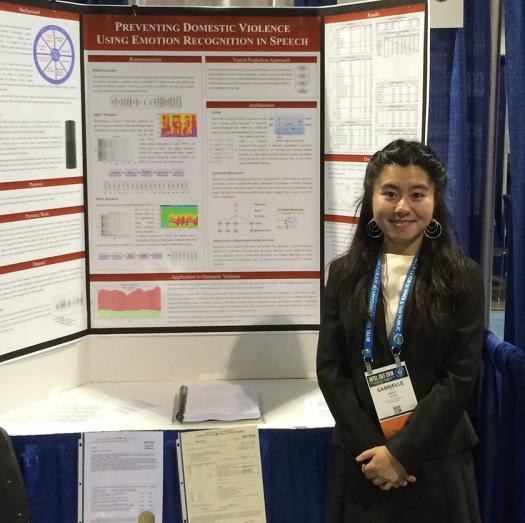STEM Outreach, Young & Amazing
Preventing domestic violence with smart technology

Can domestic violence be prevented? Gabrielle Liu, a high school student from Nashville, Tennessee, believes so — through technological means.
Gabrielle’s high school science fair project focused on the challenges of detecting and preventing domestic violence. “It’s one of the most underreported social problems in the U.S. and abroad,” she said. “Social stigma and the possibility of retaliation, among other factors, often prevents victims from self-reporting.”
Gabrielle participated in her first science fair in sixth grade. “Science fairs have given me the chance to test my interests and discovery my passions,” she said. “I love the process of discovery and like to think of investigation as a riveting treasure hunt.” Her current project showcases her passion to help domestic violence victims.
Verbal and emotional abuse have been found to be precursors to escalating violence, Gabrielle explained. “I wanted to see if I could develop a targeted approach to recognizing emotions from speech, and apply this to detecting potential risk of domestic violence,” she said.
Gabrielle’s motivations have led her to create an algorithm, which can be used by AI assistants like Alexa or Google Home, to detect the risk for verbal and emotional abuse.
Science and technology can be harnessed to address community issues and societal problems.
“The neural network-based algorithm profiles the emotional state of a household over time through verbal interactions,” she explained. “This can provide useful information regarding potential risk for domestic violence. For instance, consistently elevated levels of anger and fear can be a red flag.”
Gabrielle’s algorithm is currently in the prototype phase, and she plans on testing it in sample households in the fall. In order to protect victims, the app will be benignly named and can be integrated into existing skills in AI assistants. “This way it would be easy to discretely install on an AI assistant,” she said.

Over the past year, Gabrielle talked to women in the Middle Tennessee YWCA’s Domestic Violence Help Program, which provides emergency shelters, counseling, support groups, and transitional housing for domestic violence victims. “I was inspired to find ways to apply technology to address this social problem and potentially help victims,” she said.
“Text content alone is often insufficient to identify the emotions conveyed by a speaker,” Gabrielle explained. Gabrielle’s algorithm uses features that represent tone, pitch, tempo, volume, and other auditory patterns with an attention-based long short term memory (LSTM) neural network to identify emotions in speech.
Gabrielle believes these emotional profiles can serve as risk indicators for the presence of domestic violence, sound the alarm for victims, and offer relief and support for those seeking assistance.
Her technology was selected by her local science fair for recognition as a Society for Science & the Public Community Innovation Award winner. This award honors students participating in science fairs around the world who are making a difference in their communities. In 2018, the Society rewarded 20 young scientists with $500 prizes — and Gabrielle was one of them.
“I feel honored to have received this award because it affirms my belief that science and technology can be harnessed to address community issues and societal problems,” Gabrielle said. “This motivates me to continue striving for greater innovation to overcome these problems and to encourage others to join me in improving our global community.”
I love the process of discovery and like to think of investigation as a riveting treasure hunt.
This summer, Gabrielle is attending the Research Science Institute, a summer program at MIT, where she will live on campus and pursue an individual research project with the help of experienced scientists and mentors.


